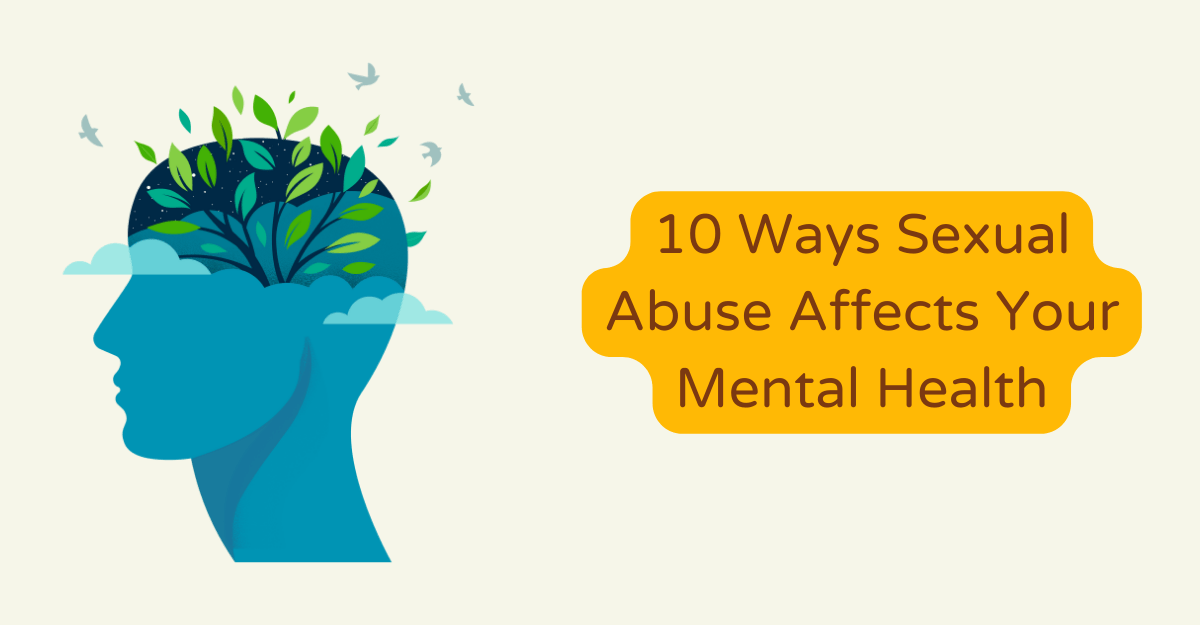
10 Ways Sexual Abuse Affects Your Mental Health
A person’s mental health and general well-being can be significantly and permanently impacted by the extremely traumatic experience of sexual abuse. Trust, relationships, and self-esteem are just a few of the many difficulties that survivors of sexual assault frequently encounter when navigating the aftermath of trauma. Promoting survivors’ healing, resiliency, and recovery requires an understanding of the ways that sexual abuse affects mental health.
Trauma and Post-Traumatic Stress Disorder (PTSD)
Many survivors of sexual assault may acquire Post-Traumatic Stress Disorder (PTSD) because of the tremendous trauma they experience. People may suffer from bothersome thoughts, recurring nightmares, flashbacks, and mental anguish associated with the traumatic incident. The symptoms of PTSD can have a substantial negative influence on day-to-day functioning and general mental health, necessitating treatment and professional assistance in many cases.
Anxiety Disorders
Anxiety disorders such as panic disorder, social anxiety disorder, and generalized anxiety disorder, or GAD, are more common among survivors of sexual abuse. Survivors frequently experience feelings of anxiety, uncertainty, and hypervigilance, which makes it difficult to feel secure and at ease in day-to-day living. Anxiety disorders may seriously damage social interactions, employment, and relationships, which can cause anguish and loneliness.
Depression
Depression symptoms, such as chronic melancholy, lack of interest in activities, changes in eating or sleep habits, and feelings of shame or worthlessness, are common among survivors of sexual assault. Sexual abuse trauma may have a significant impact on a person’s identity and feeling of self-worth, which can lead to the emergence of depressive symptoms. Depression frequently requires professional involvement and therapy to alleviate symptoms, which can have a substantial influence on productivity and standard of life.
Trust and Relationship Issues
Those who have experienced sexual abuse may find it challenging to build and sustain a positive relationship with others due to issues with intimacy and trust in relationships. Feelings of betrayal, helplessness, and vulnerability during the abusive episode may be the cause of trust difficulties. Because of this, survivors might shy away from intimate relationships, find it difficult to be intimate, and find it difficult to set boundaries with other people.
Shame and Guilt
Survivors of sexual abuse frequently experience feelings of shame and guilt, which are frequently brought on by self-blame, societal stigma, and false beliefs about the act of sexual violence. Survivors may have low self-esteem, self-destructive habits, and mental pain as a result of internalizing emotions of guilt and self-blame for the abuse. Regaining one’s sense of dignity and self-worth after experiencing sexual assault requires overcoming feelings of guilt and humiliation.
Substance Abuse and Addiction
Substance misuse is a common coping mechanism used by survivors of sexual abuse to mask painful feelings, deal with trauma, and self-medicate signs such as anxiety and melancholy. Substance misuse can worsen mental health conditions and raise the possibility of addiction, which can lead to a vicious cycle of reliance and unhealthy coping techniques. Overcoming substance misuse and fostering long-term recovery requires addressing fundamental trauma and obtaining expert help.
Self-harm and Suicidal Ideation
Sexual abuse survivors are more likely to turn to self-harming techniques like burning, cutting, or drug usage to deal with their emotional anguish and suffering. In addition, trauma and persistent psychological suffering frequently result in suicide ideation or ideas of self-harm for many survivors. Survivors who are contemplating self-harm or suicide must get prompt assistance and support, as well as appropriate mental health services and therapies.
Dissociation and Depersonalization
Victims of sexual abuse frequently employ depersonalization and dissociation as coping strategies to distance themselves from upsetting memories and feelings. Depersonalization is the sense of being cut off from one’s body or identity, whereas dissociation is the separation from one’s thoughts, feelings, and environment. While these coping strategies could offer momentary solace from discomfort, they also obstruct day-to-day activities and exacerbate emotions of loneliness and detachment.
Intimacy and Sexual Dysfunction
Intimacy and sexual functioning can be problematic for survivors of sexual abuse due to triggers associated with trauma, unfavorable connections with physical contact, and relationship problems. Sexual dysfunction is widespread among survivors and may have a major negative influence on relationships and self-esteem. This includes erectile dysfunction, arousal issues, and pain during sexual activity. Intimacy and sexual relationships may be improved, and underlying trauma can be addressed by survivors who seek treatment and assistance from trained specialists.
Impact on Self-Identity and Self-Concept
One’s perception of self-identity and self-concept can be significantly impacted by sexual abuse, which can result in feelings of shame, inadequacy, and worthlessness. Because of the abuse, survivors may have emotions of self-blame, doubt about themselves, and poor self-esteem, which can negatively impact their trustworthiness, assertiveness, and general well-being. Rebuilding an optimistic self-image, regaining personal agency, and cultivating self-acceptance and self-compassion via therapy, peer support, and self-care routines are all important aspects of healing from sexual abuse. Seeking guidance and legal support from a compassionate California sexual abuse lawyer can also be pivotal in empowering survivors to seek justice, reclaim their sense of dignity, and hold perpetrators accountable for their actions.
Conclusion
The effects of sexual assault on mental health are broad and complicated, covering a spectrum of mental health and interpersonal issues. By understanding and treating the impacts of trauma, survivors may engage on a road of growth and healing, recovering their sense of dignity, resiliency, and dignity. Survivors can develop resilience, strength, and self-care via self-care routines, support systems, and treatment.






